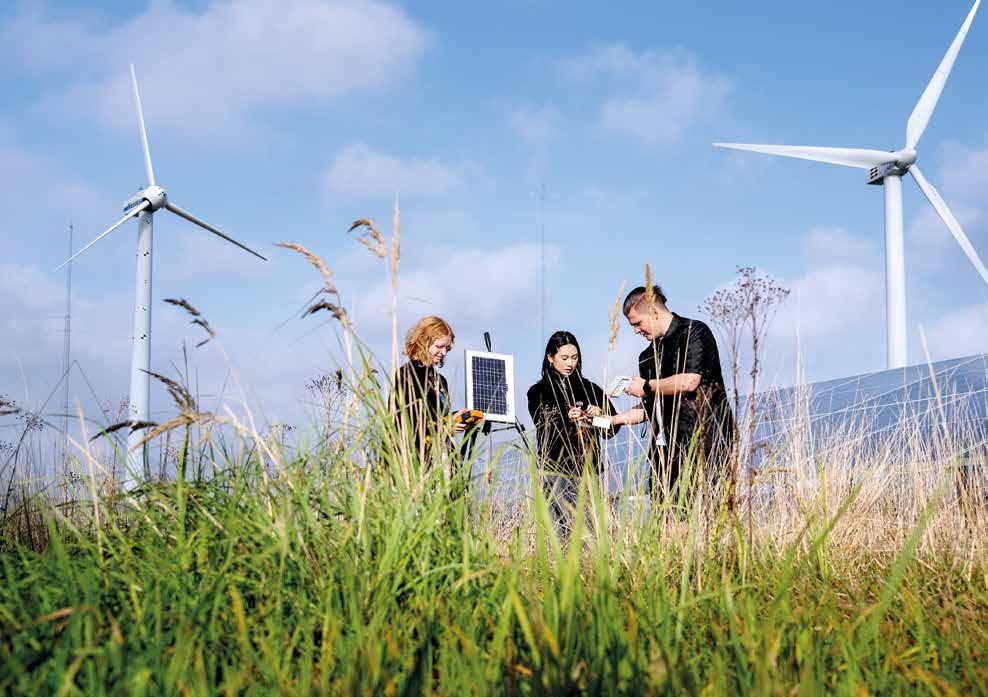

FACTS & FIGURES 2025
President’s introduction
Our mission
Research
Rankings
Research facilities
Education
Innovation and entrepreneurship
Scientific advice
Equal opportunities
Taking responsibility
International relations
Organization
Finances and human resources
Campuses and locations
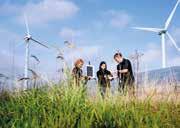
Cover: Students enrolled in the Design of Sustainable Energy Systems programme learn to design innovative solutions for energy systems and the many elements included in, for example, wind turbines, solar cells, electric cars, and storage. Photo: Bax Lindhardt.
Published: April 2025. Managing editor: Miriam Meister. Facts and Figures: This report is based on DTU’s Annual Report 2024. Ranking as per 10 April 2025. Photos: Bax Lindhardt, Thomas Steen Sørensen, Marie Bentzon, Colourbox, Datte Valente, Casper Harvey Geise, NASA/JPL-Caltech/MSSS, Emil Rolskov Kjældgaard. Production: Marianne Tingkov
“Innovation is about creating what truly matters.”
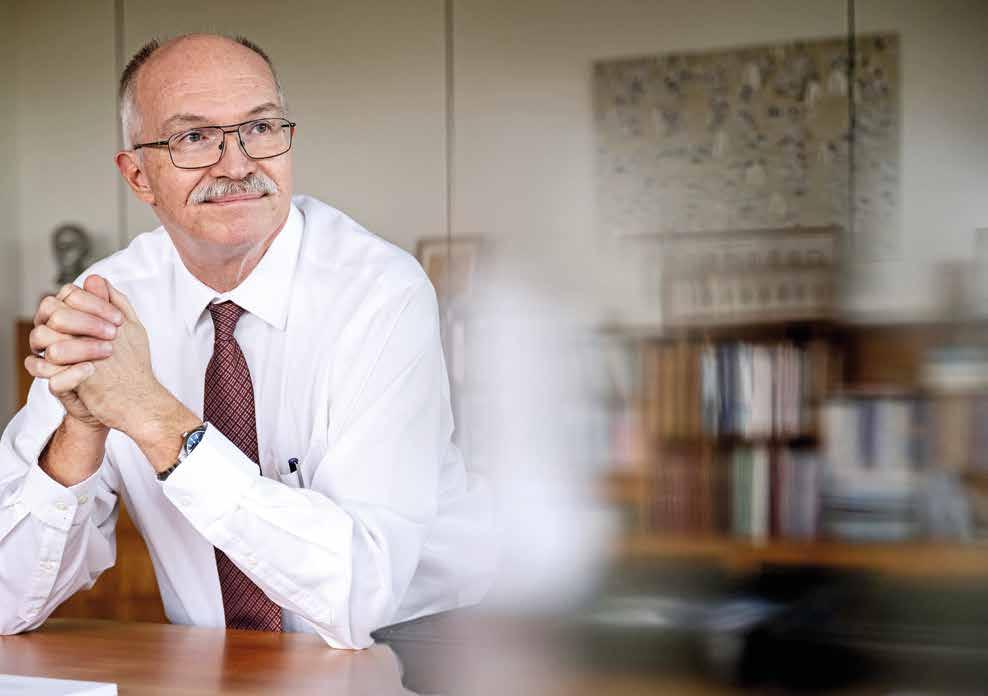
We live in an increasingly unpredictable world. From geopolitical shifts to climate challenges, uncertainty is becoming a defining feature of our time. Thankfully, history has taught us that science and innovation can help steady the ship in rough conditions. They provide the tools we need to navigate complexity, address global challenges at full throttle, and create lasting impact to keep us on an even keel.
At DTU, we believe that knowledge must be transformed into solutions that steer our future in a better direction. More than ever before, the world needs technologies that drive sustainability, strengthen resilience, and improve our lives. The challenges we face—from energy security and climate change to an ageing population and the digital transformation—demand bold and creative thinking and decisive action.
This is why DTU continues to strive to bring together engineering excellence and entrepreneurial minds—and this is why we continue our dedication to educating engineers with deep academic competences, perseverance, and an innovative mindset.
At DTU, our researchers and students combine scientific depth with an ambition to make a difference—for the better of the planet: We endeavour to facilitate innovation that truly matters, to foster entrepreneurs who develop technology for people and set up businesses that contribute to creating a more sustainable and secure world.

Anders O. Bjarklev, President
We develop and create value through the technical and natural sciences for the benefit of society
The future is shaped by people who develop solutions to the challenges facing the world. In response to the global climate challenge and accelerating depletion of Earth’s resources, DTU strives for a sustainable future by developing technology for people.
Such innovative technologies will also help to achieve well-being, good health, and education. At DTU, we believe we can create a better world through collaboration and partnerships, and by working with people from different academic backgrounds to develop and deploy value-added technology.
Our collaborations with various research partners— from institutions to universities across the globe— benefit people, societies, and the world. We employ digitalization to drive research breakthroughs and
innovation at the intersection between academic disciplines and the data-driven technologies of the future.
In 1829, Hans Christian Ørsted—who discovered that electric currents create magnetic fields—took the initiative to set up DTU with a clear mission to develop and create value using science and engineering for the benefit of society.
DTU continues to grow and pursue Ørsted’s original mission. DTU students and staff collaborate, research, share knowledge, and find new solutions to global problems.
We have a vision for a better world and invite the world to join us in realizing that vision.
Andrei Chirtoaca (left) and Sara Lopez Alaguero met during their master’s studies at DTU. In just three years they have created a successful business that manufactures robots for the healthcare sector. The robots can be found in, e.g., hospitals and rest homes where they have allowed staff more time with patients instead of having to walk to get equipment. In 2024, Yuman won the Entrepreneurship Award of the Ministry of Industry, Business and Financial Affairs and the Foundation for Entrepreneurship in the Life Science category.
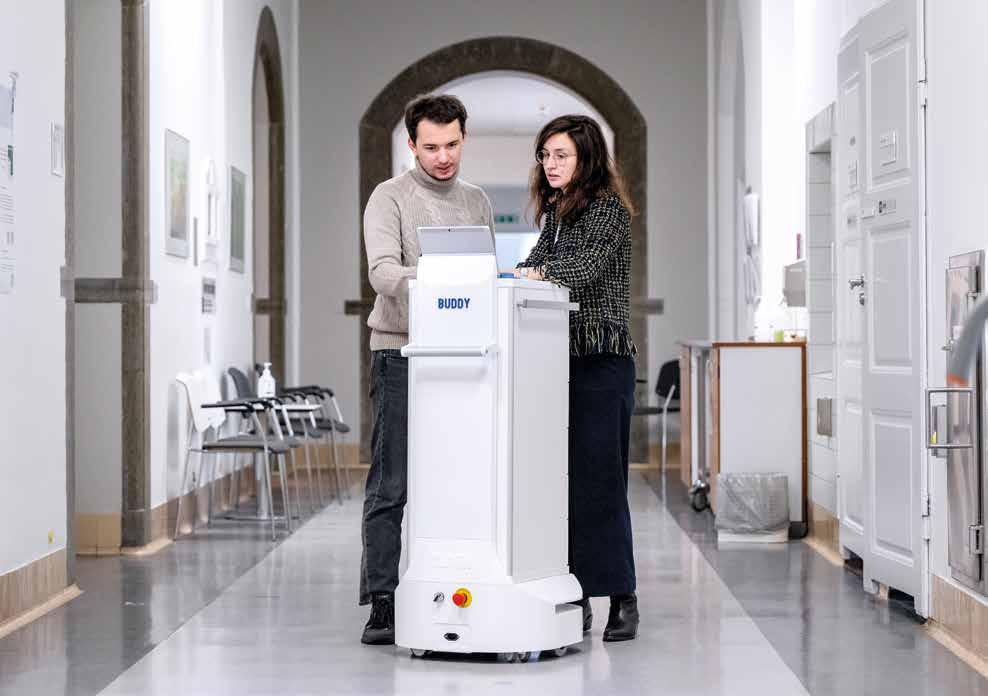
Cutting-edge research projects and selected grants
Research is the basis of all our work. We develop new technology for people through research and benefit society through education, innovation, and scientific advice. Our researchers work across disciplines on cutting-edge projects, and they collaborate with leading academic, private, and public partners globally.
Research at DTU works with the technical and the natural sciences to provide society with innovative solutions for sustainable change by making new discoveries and driving change. Focus areas include a large spectrum of science and engineering disciplines, such as digitalization, energy technologies for a sustainable future, and life science and biotechnology, which are all highly relevant for society.
DTU has a strong track record when it comes to securing research funding. As such, in 2021-2024 we received more than EUR 220 million from the EU’s Horizon Europe research and innovation programme. This places DTU in the top four among European universities.
Innovative ideas and facilities
In 2024, DTU researchers and colleagues at Lund University got closer to being able to generate universal blood for type B blood recipients. The
researchers discovered enzymes that—in a mix with red blood cells—can minimize the immune reaction that normally occurs when a recipient receives a transfusion that does not match their blood type. The enzyme cocktails target both documented and previously unknown antigens that can trigger such immune responses.
In a world first, researchers at DTU have been able to map the processes involved in generating and transporting the massive amounts of meltwater that run off the surface of Greenland’s ice sheet and flow beneath the ice and into the Arctic Ocean. Meltwater from the ice sheet is the single greatest contributor to global sea level rise, making it essential to properly understand what goes on underneath the ice, as this knowledge can help improve climate models.
Also in 2024, the Novo Nordisk Foundation announced that it had earmarked more than EUR 130 million for a new major biotechnology initiative at DTU. Under the initiative, researchers will come together to create knowledge and biologically based solutions that can replace fossil fuels in the areas of sustainable materials, microbial foods, and microorganisms for net-zero agriculture.
Selected grants 2024
In public funding, DTU researchers received six prestigious grants from the European Research Council. They comprised two Consolidator Grants, two Starting Grants, and two Synergy Grants.
Nationally, eight DTU researchers received the socalled Sapere Aude DFF Research Leaders Starting Grants from the Independent Research Fund Denmark, giving the promising researchers a chance to lead their own research groups. Also, two younger DTU researchers received an Elite Research Travel Grant from the Danish Ministry of Higher Education and Science.
In private funding, the Novo Nordisk Foundation awarded DTU nine excellence grants. This comprised one NNF Challenge Programme grant, four Investigator grants, three NNF NERD grants, and one NNF RECRUIT grant.
The Villum Foundation distributed two Villum Young Investigator grants among young and talented DTU-researchers so they can pursue their own ideas and establish their own research groups. Two other promising young researchers secured an LF Ascending Investigator grant from the Lundbeck
Foundation to help them establish their careers and the Carlsberg Foundation awarded one Semper Ardens Advance grant to a team of three excellent researchers, two of whom are from DTU.
In 2024, one of the world’s most cited researchers, DTU Professor Jens Kehlet Nørskov, received the Hans Christian Ørsted Gold Medal in recognition of his lifelong research in catalytic processes focusing on green solutions for energy storage and the production of chemical building blocks and fuel.
Furthermore, Professor Daniella Pigosso received the Grundfos Prize in recognition of her groundbreaking work on design for sustainability, which aims to ensure that sustainability solutions do more good than harm.
Also, Professor Andreas Hougaard Laustsen-Kiel received the Lundbeck Foundation Young Investigator Prize for his work in antibody technology where he studies toxins from poisonous animals and bacteria in order to develop, e.g., snakebite antivenom.
5,230 publications in 2024 1.53 category normalized citation impact*
73%
of publications by DTU researchers are co-published with researchers from institutions outside of Denmark
17% publications in the top 10% most cited
Watch videos
What is absolute sustainability?
dtu.dk/2025profile1
Developing snakebite antivenoms dtu.dk/2025profile2
*Normalized citation impact: Citation impact (citations per publication) normalized for subject (Web of Science Category), year, and document type. A value of one represents performance on par with the world average. DTU’s citation impact is thus 53 per cent above the world average.
Leiden Ranking Citation impact indicator (top 10% publications)
All sciences
Leiden Ranking Collaborative Publications with Industry Indicator
QS World University Ranking
THE World University Rankings
EngiRank EU Ranking
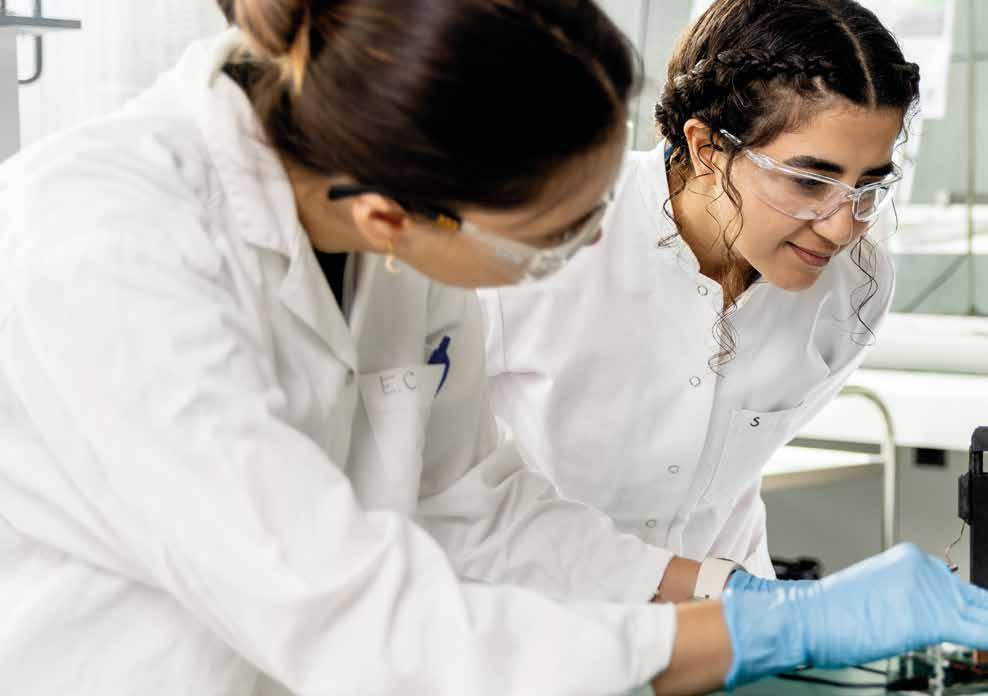
* As of 10 April 2025.
** The Nordic region consists of Denmark, Sweden, Norway, Finland, and Iceland.
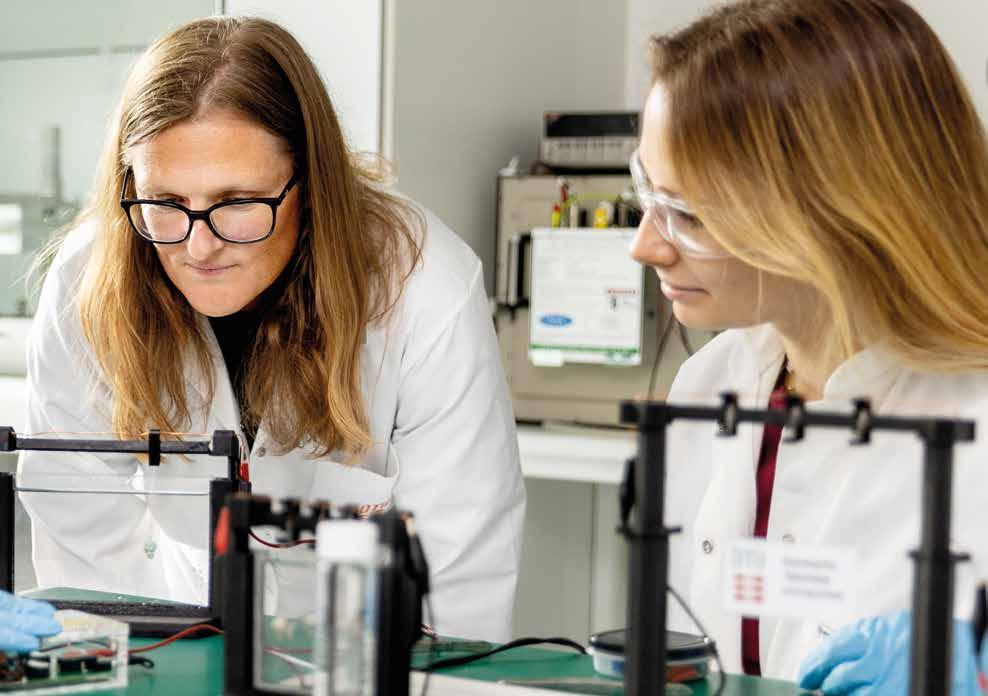
ARTIFICIAL MUSCLES
DTU-researchers have created artificial muscle fibres in the form of silicone threads with a cavity that a conductive liquid can run through. Just like when the brain sends an electrical signal to the body’s muscles to activate, the researchers can send a current through the artificial muscle fibres via the conductive fluid. This causes them to contract and enables them to lift 200 times their own weight.
The idea is to sew the muscles into a garment which can give renewed strength to the wearer. The work – which is led by Professor Anne Ladegaard Skov (third from the left) – has the potential to make life easier for millions of people with impaired muscle function allowing them to carry five extra kilos.
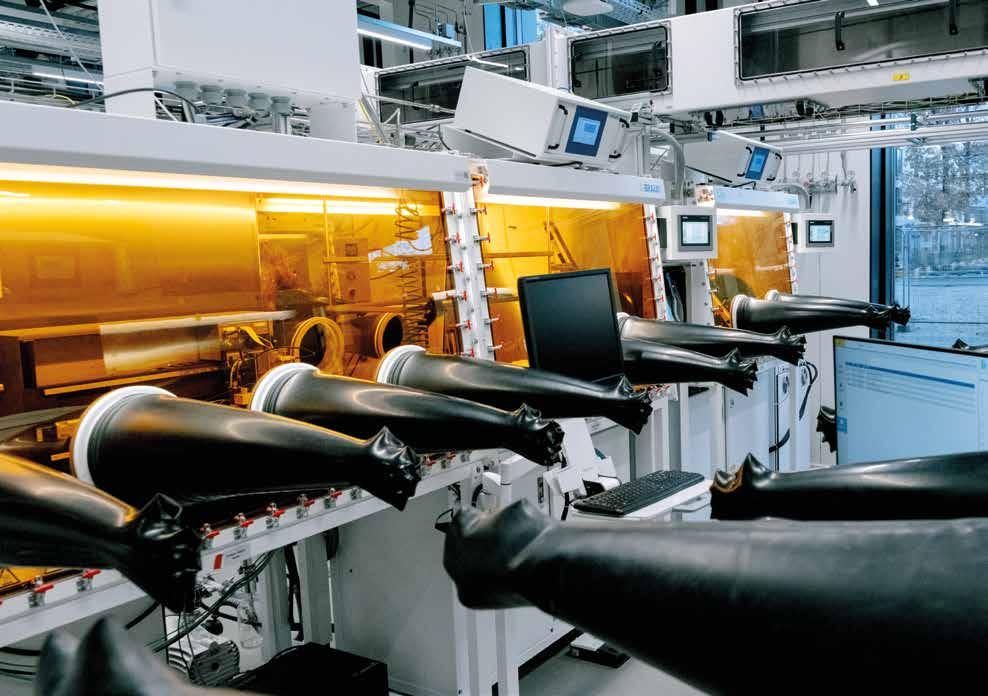
GIVING THE GREEN TRANSITION A HELPING HAND
DTU’s new Climate Challenge Laboratory brings together energy and materials researchers from Danish and international environments who work to develop materials that can produce and store green energy.
World-class research infrastructure
With a strong focus on sustainability, digitalization, and life sciences, DTU provides state-of-the-art laboratories and advanced testing environments that support groundbreaking research and foster innovation across a wide range of scientific and technological disciplines.
DTU’s commitment to maintaining world-class research environments is evident in its continual investment in new technologies and facility upgrades, which helps researchers push the boundaries of scientific discovery and enable technological breakthroughs.
A wide range
The research infrastructures at DTU facilitate research in areas such as energy, materials science, chemical and biochemical engineering, biotechnology, robotics, and artificial intelligence. Laboratories are equipped with sophisticated instrumentation, including testing environments for renewable energy solutions, clean rooms for nanotechnology, and supercomputers for complex simulations.
The university also features specialized facilities dedicated to acoustics, structural engineering, and medical imaging. This ensures that researchers have access to state-of-the-art resources.
Collaborative approach
A key aspect of DTU’s research excellence lies in a collaborative approach: By partnering with industry leaders, government institutions, and international research organizations, DTU ensures that these facilities are not only used for fundamental research but also contribute to real-world technological advancements.
This synergy between academia, industry, and authorities enables researchers to translate theoretical knowledge into practical applications, addressing and giving advice on global challenges such as climate change, healthcare innovations, and smart infrastructure.
DTU’s facilities are available to industry, enabling companies to develop innovative solutions to challenges, increase productivity and improve business operations.
More information
Research infrastructure at DTU dtu.dk/2025profile3
EDUCATION: STUDY PROGRAMMES
Educating engineers for the future
DTU’s study programmes are interdisciplinary and centred on the technical and natural sciences. We educate engineers in several locations in Denmark and Sisimiut, Greenland. We also offer digital study programmes and courses.
Our students work closely with industry to supply their theoretical knowledge with hands-on experience in solving real-life problems. Hence, knowledge about sustainability, digitalization, and innovation are cornerstones of our study programmes.
Bachelor of Engineering (BEng)
These 3.5-year industry and application-oriented engineering programmes are taught almost exclusively in Danish. They are based on the CDIO (Conceive, Design, Implement, and Operate) concept and incorporate a six-month internship in the industry. This ensures students have the theoretical and practical skills essential for working hands-on as engineers.
Bachelor of Science in Engineering (BSc Eng)
These 3-year research-based undergraduate engineering programmes are taught almost
exclusively in Danish, except for the General Engineering programme. They qualify students for their studies at the master’s level.
Our programmes build on “the polytechnical foundation”—a block of mandatory courses ensuring common ground within the basic natural science subjects, mathematics, physics, chemistry, biology as well as programming. Most courses have a focus on incorporating perspectives on digitalization, sustainability, and innovation.
Master of Science in Engineering (MSc Eng)
These English-language 2-year research-based programmes are at the highest technological level. Students acquire the qualifications and skills necessary to analyze, synthesize, and evaluate theory and experiments relating to complex engineering systems, problems, and solutions.
Industry MSc in Engineering (MSc Eng)
The Industry MSc model makes it possible for students to spend their first year studying full-time at DTU. The second and third years combine studies and a 25-hour work week within a company, giving students an insight into the industry while pursuing
their master’s degree. The participating companies get an opportunity to spot and shape new talent and create a highly qualified workforce.
PhD
PhD students conduct scientific research projects of the highest international standard. As part of their education, all PhDs must attend mandatory courses across academic disciplines, e.g. sustainability assessment and research communication courses. DTU also offers industrial PhD programmes, where students are employed by a company while pursuing their PhD degree.
Lifelong learning
DTU meets society’s need for lifelong learning by activating our research and knowledge into study programmes and courses for professionals.
We offer a range of executive and specialized continuing education programmes, ranging from executive programmes, part-time diplomas and master’s programmes to flexible education, open online courses, and single-course programmes.
Education in figures
34% women enrolled Gender balance:
107 countries Students from
EDUCATION: STUDENT LIFE
Applying knowledge to solve real-life problems
All DTU’s study programmes are interdisciplinary and designed to promote sustainability, innovation, and an entrepreneurial spirit. Students have handson access to world-class facilities and receive an innovative education with industry partners where they can apply their theoretical knowledge to solve real-life problems.
Academic learning
Based on cutting-edge scientific knowledge, all teaching, supervision, and course development is carried out by educators who are actively involved in research and innovation. We teach using methods that reflect the way we work—innovation, critical thinking, collaboration, and engagement—all of which shapes our graduates. Students develop analytical skills through independent study, group work, active participation in discussions, and close collaboration with fellow students and professors.
Amazing study environment
The study environment is vibrant and international, and most students stay after lectures to network, work on their own projects, or take part in one of our many extracurricular activities.
Great job prospects
A survey published in 2022 shows that 60 per cent of DTU graduates were employed in jobs of relevance to their studies while enrolled at the university. And DTU graduates are in high demand: Nine out of ten MSc and BEng graduates have found employment within a year of finishing their studies.
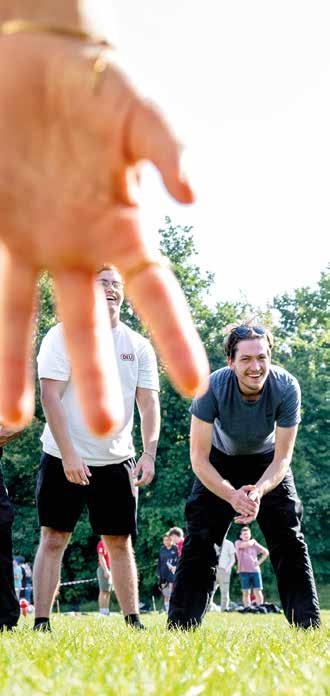
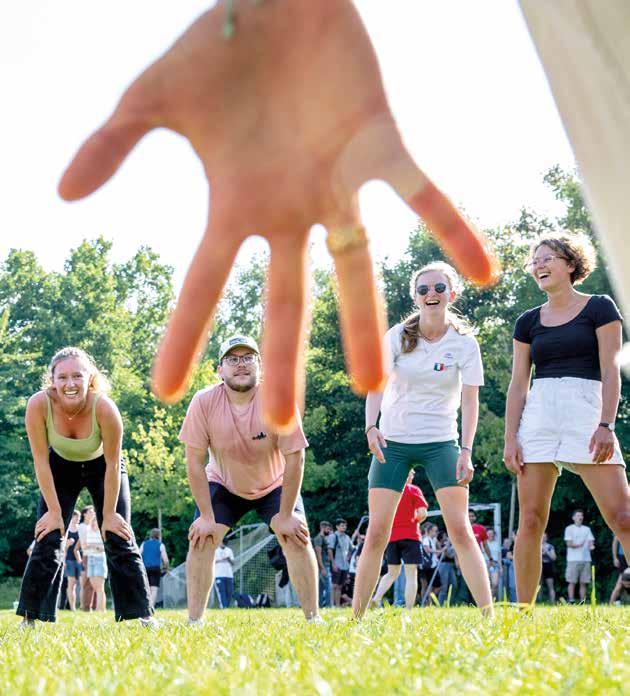
DTU attracts students from all around the world. In 2024, DTU introduced a revamped intro week for both undergraduate and graduate programmes, which gets new students acquainted with the study environment through academic and social activities.
More information
DTU Blue Dot projects dtu.dk/2025profile4
INNOVATION AND ENTREPRENEURSHIP
Bringing ideas and inventions into the world
DTU has one of the most well-developed eco-systems for innovation and entrepreneurship among technical universities in Europe. This ecosystem brings new ideas and inventions from classrooms and laboratories into the real world, where they can create jobs and help solve some of the biggest challenges the world is facing.
Student innovation
One of our most significant contributions to society is the innovative and entrepreneurial mindset of our students, which stays with them when they find employment. Innovation and entrepreneurship are integrated into our study programmes, mandatory courses, and electives—for example through our Innovation in Engineering course, which is a mandatory course for all master’s students. Our students also gain experience and establish contacts with the business community through projects, events, internships, and student jobs.
Business collaboration
DTU has in-depth experience working with companies and organizations. This includes strategic research collaborations, continuing education, student projects and conferences.
The business community enjoys working with DTU because of our collaborative and innovative approach. We collaborate across academic disciplines to find innovative solutions. In 2024, DTU was engaged in 1,786 projects with the business community.
Through the DTU Industrial Partnerships programme, DTU researchers and students collaborate with companies through strategic, interdisciplinary partnerships as well as career events and workshops. By year’s end, DTU had formed 34 partnerships with companies such as Novo Nordisk, Maersk, and Alfa Laval.
Start-ups
Our students and employees continue to create start-ups that translate innovative ideas into solutions that benefit society. In 2024, 120 startups were incorporated by students and employees.* Of these, 78 were established by students and 42 by employees. Additionally, three start-ups were established by commercial players based on DTU IP.
Since 2000, staff and students at DTU have founded 1,035 start-ups of which 55 per cent are still operating (excluding those that have been acquired or merged). In 2024, the three largest companies provided jobs for around 1,000 people.
Overall last year, DTU start-ups raised around EUR 343 million in dilutive and debt funding. Figures for the Danish venture capital market from the Export and Investment Fund of Denmark show that investments in DTU start-ups amounted to 19 per cent of the total venture capital invested in Danish companies in 2024.
Commercialization
At DTU we foster a culture of innovation, where our researchers are encouraged to think about business development from the start of a research project, which increases the likelihood that the research is turned into technology for people. Thanks to this approach, a significant number of inventions are brought to market.
*Due to methodological changes in reporting DTU Startups, the figures for 2024 are not directly comparable with previous years.
In 2024, DTU researchers notified 114 new inventions as well as seven software notifications expected to create commercial value. 36 new sales, licence, and option agreements were signed for
55 inventions and two types of software. By year’s end, DTU’s portfolio of active sales, licence, and option agreements totalled 318 agreements.
DTU Skylab—an innovation hub
DTU Skylab is a 5,000 m2 facility where students, start-ups, and researchers collaborate across disciplines with businesses and organizations on innovative ideas. Activities and services include business acceleration and funding for deep tech start-ups, advanced prototyping facilities, inspiring events, sprints, and hackathons.
2024 was one of the busiest years ever for DTU Skylab with more than 200,000 people walking through its doors and 399 start-up cases receiving coaching and/or mentoring throughout the year. Of these, 93 start-up cases received around EUR 5.5 million in funding (both from DTU and external sources) to advance their innovation and business cases.
BIG IDEA THAT CAPTURES THE SMALLEST DETAILS
Watch videos
Technology Leaving no one Behind
dtu.dk/2025profile5
Student Start-up of the Year 2024
dtu.dk/2025profile6
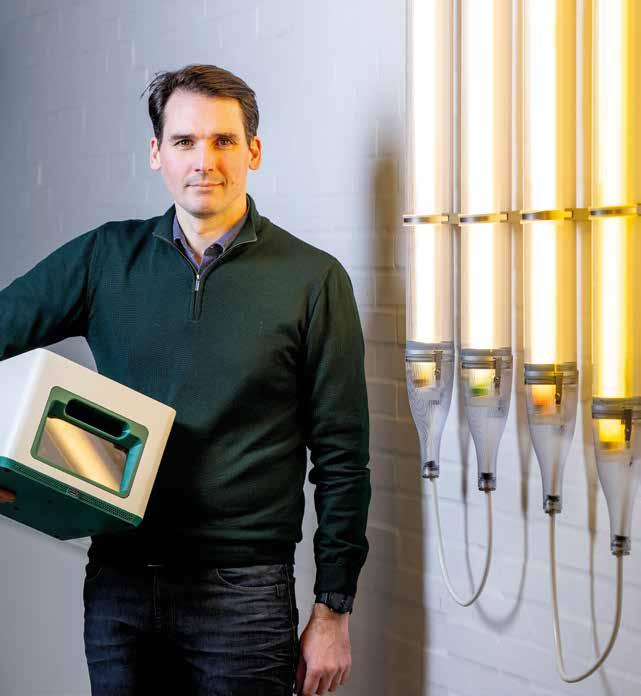
DTU spinout Clair Scientific has developed an automated microscope, which is half the size and considerable cheaper than competing microscopes available on the market. The ‘Z1’ microscope, which co-founder Hugh Simons is holding, uses novel imaging technology and cloud computing. In 2024, the spinout won the Danish Industry Foundation’s Entrepreneur Award at the Danish Tech Challenge.
A unique Danish model for the benefit of society
To ensure that science underpins decision-making in society, DTU offers scientific advice to public sector authorities, industries, and international institutions.
National scientific advice
At DTU scientific advice is firmly based on synergies between university research and applied research, as well as on an in-depth understanding of sectorspecific challenges, acquired through extensive collaborations with our strategic partners.
DTU has strategic partnerships with Danish authorities on nutrition and food safety, toxicology, aquatic resources, waste management, geodesy, transportation, and radioactivity.
Our advisory services include complex problem solving, risk characterization for informed standard setting, development of surveillance systems for ongoing risk assessments, and diagnostic capacity for contingency planning and crisis resolution.
DTU offers scientific advice on a wide range of topics including advice on chemical and microbiological food safety, the sustainable utilization of living aquatic resources, and transportation modelling.
In 2024, a new centre for PFAS research was established at the initiative of and located within DTU with funds allocated from the research reserve. The centre brings together experts from DTU, the University of Copenhagen, the University of Southern Denmark, and Aarhus University. They will provide advice on how best to prevent, contain and clean up PFAS pollution.
International scientific advice
The University also provides scientific advice to international authorities and organizations, such as the European Food Safety Authority, the European Space Agency, the International Council for the Exploration of the Sea, and the European Commission’s Scientific, Technical and Economic Committee for Fisheries.
Furthermore, DTU serves as EU reference laboratory for pesticides in cereals and feedstuffs; food process contaminants, metals, and nitrogenous substances in feed and food; antibiotic resistance, and for Fish and Crustacean Diseases. Moreover, DTU serves as the FAO Reference Centre for Antimicrobial Resistance and the WHO Collaborating Centre for foodborne pathogens and genomics.
Providing evidence-based advice on how to eat a diet that is healthy for both people and the planet requires sound science. DTU researchers continually provide scientific advice on food and nutrition to the Danish authorities. Their analyses and research, underpin, e.g. Denmark’s Official Dietary Guidelines, which were tweaked with input from DTU in 2024.

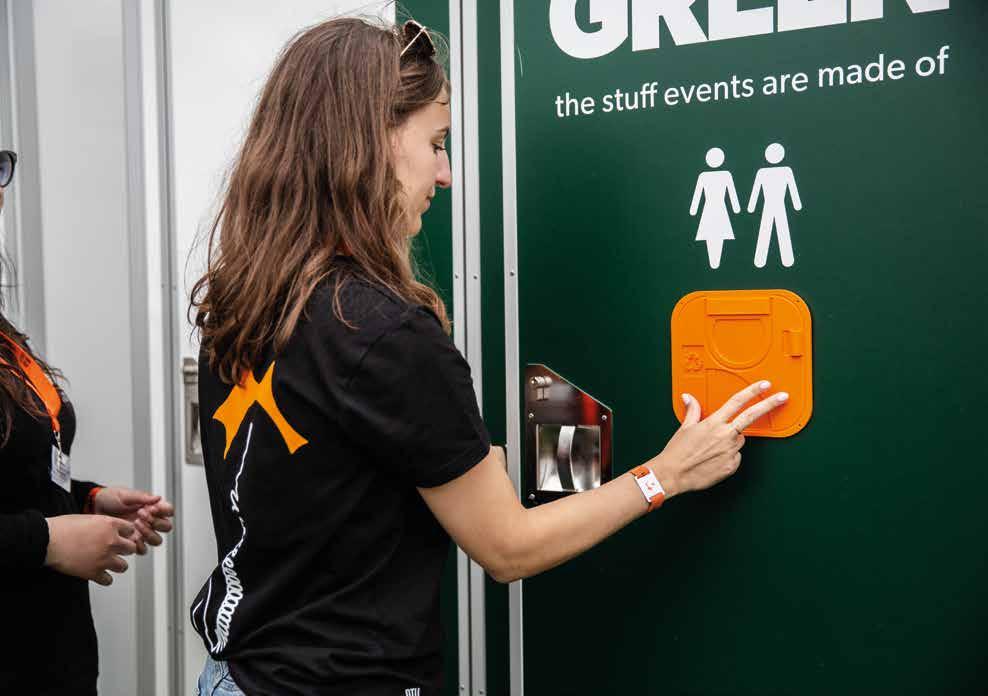
EASIER WAYFINDING
Finding your way around a festival toilet can be an unhygienic affair if you have a visual impairment. A tactile, 3D-printed map created by a group of DTU students allows users to familiarize themselves with the layout before entering the cubicle.
EQUAL OPPORTUNITIES
Leaving no one behind
At DTU we are committed to embracing and promoting diversity, equity, and inclusion, DE&I, in order to achieve our ambition of creating technology that can make the world a better, more sustainable, fair, and inclusive place.
Having a diverse pool of staff and students and an inclusive environment to support the existence of diverse ideas and perspectives helps ensure that we are aware of our blind spots when people come together to solve problems and develop technology for people.
We have committed ourselves to working constructively and proactively towards DE&I. To mention a few, we work to enhance our common bias awareness, to support and structure unbiased recruitment, and strengthen our ability to openly address our own challenges. Our aspirations are set out in a plan for DE&I at the University, which will guide our ongoing work on creating equal opportunities for all, regardless of identity and observance.
DTU also has a continued focus on providing students with physical or mental disabilities with access to flexible teaching options.
Technology for all people
At DTU we also work on long-term diversity and inclusion initiatives to build educational, research, and entrepreneurial opportunities with partners outside our University. One such initiative is the Technology Leaving No One Behind project powered by DTU Skylab. It was created in 2019 in collaboration with Disabled People’s Organizations Denmark, Association of Youth with Disabilities, and Bevica Fonden.
The project is focused on making inclusion and accessibility a natural part of the development of new technological solutions. One component of this project is to support the integration in DTU’s study lines of lectures on how to engineer technologies for real and not ideal people, and we have people with disabilities team up with DTU students to develop ideas that bring into consideration real-world problems faced by people with disabilities.
This has resulted in, e.g., inclusive mobility solutions for the Metro, a tactile map for people with visual impairment to navigate toilets, and a student startup making wayfinding easier for guests with physical and cognitive disabilities while also improving general security.
The DTU online open-source ‘Universal Design Guide’ playbook provides thoroughly tested methods and specific tools through an interactive website to help organize and prepare for inclusive development and workshops. Initially intended for engineering students at DTU, the playbook has reached 160 countries and been used by universities around the world since its creation.
Working across geographical boundaries
Through the annual Next Generation initiative, students, young researchers, and early-stage entrepreneurs with diverse backgrounds join a three-week hybrid innovation course and 8-day programme in Copenhagen to turn sustainability challenges into innovative solutions and action. Particular focus is put on participation from universities in Africa, Asia, and South America and the challenges faced by these regions.
In 2024 the focus of the initiative was on emerging digital solutions in collaboration with Digital Tech Summit. Participants proposed, e.g. autonomous water drones to reduce water waste in India, a patientdoctor platform to create access to healthcare in remote areas, and real-time data for farmers on crop health and soil conditions using drone technology.
TAKING RESPONSIBILITY
Committed to a responsible future
DTU’s commitment to a responsible, sustainable future is driven by our development of technology for people. The knowledge and innovative thinking of our researchers and students help move the world in a more sustainable direction.
Through research and development of new technologies, DTU helps pave the way for the green transition, but the individual solutions rarely create change independently. DTU’s strength within research in the green transition lies in interdisciplinary collaborations, where we develop advanced technologies and sustainable solutions that will benefit society. Our focal points in research regarding sustainability are construction, energy, biosolutions, transport, food, and climate.
Thoughtful use of resources
As a university, we are under a special obligation to act responsibly and set a good example for our staff, students, neighbours, and partners. This is reflected in our university-wide efforts to improve our environmental, social, and governance practices.
Both on campus and when collaborating with external parties, DTU works actively to reduce CO2 emissions and develop circular solutions that minimize the strain on Earth’s resources. We continuously upgrade our facilities so staff and students can minimize our resource consumption. Therefore, sustainability is a high priority in our core services, workflows, and operations to ensure DTU is a university with an even more significant impact on our surroundings.
Cutting-edge research facilities
In 2024, DTU opened a new lab dedicated to research into sustainable waste utilization. The new facility can receive large volumes of waste and conduct complex experiments that increase understanding of how society can maximize recycling and minimize waste generation.
The lab features analytical equipment that allows staff to, e.g., analyse the content of PFAS in samples—something that would previously have to be done externally.
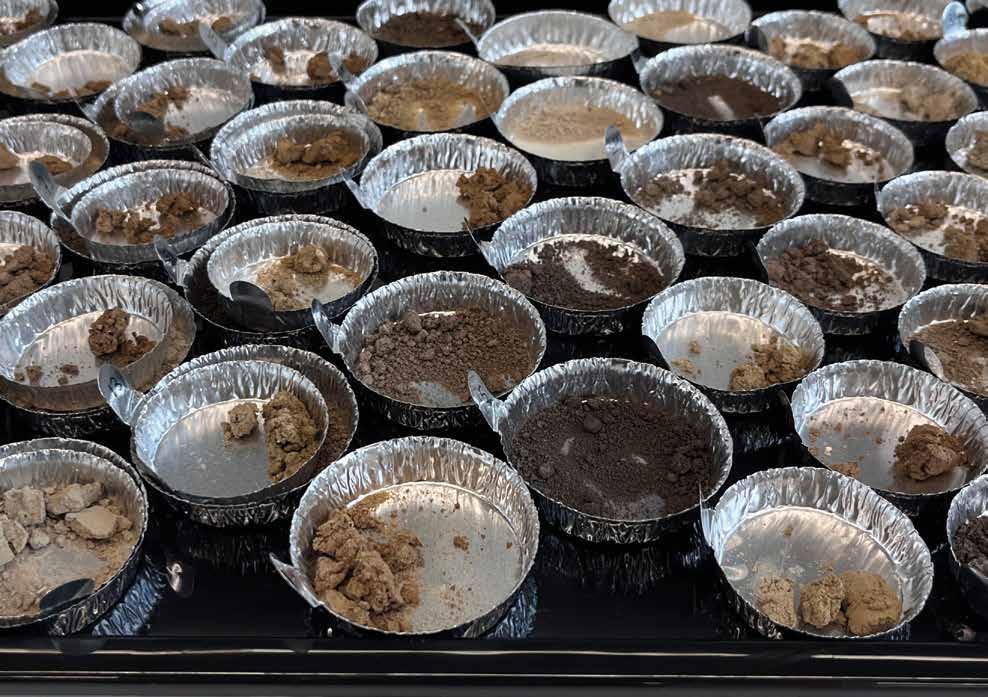
Global outreach
Technology is created by innovative researchers who work through global partnerships. At DTU, we identify the best match between researchers, fields, and projects. We collaborate with other elite technical universities throughout the world, and we are active partners in strong, international alliances.
Alliances and strategic partnerships
DTU’s network of alliances and strategic partnerships spans research, education, scientific advice, and innovation. Together we promote synergy, quality, impact, and visibility.
One of these is the EuroTech Universities Alliance, where six leading universities of science and technology have a vision that focuses on sustainability, education, and a technologically sovereign and resilient Europe. Our aim is to create a unique environment for international talents to lead a new generation of change agents in research, entrepreneurship, industry, and society.
DTU is also part of the Nordic Five Tech strategic alliance, where five leading technical universities in the Nordic region create an extended campus for students and staff to conduct research, share knowledge, and follow joint educational programmes.
DTU also looks to the global job market to attract international resources and talent, and we build on in-depth collaboration and a mutual match in excellence and values.
An international education
Students from more than 100 countries come to study at DTU every year, and we also encourage all our students to spend a semester or two abroad.
An exchange period helps students grow—both academically and personally—and creates networks that will prove invaluable in a future career. Our students have the chance to work and study with the best research universities in the world. We invite students from all over the globe to study at our university, and we offer 32 MSc Eng programmes in English.
Exchange students
Student exchanges between DTU and other universities has bounced back and is on par with the period before the coronavirus pandemic. In total, 987 international exchange students came to study at DTU, and 849 DTU students went abroad in 2024.
Top ten global exchange partners in 2024*:
Technische Universität München, Germany
Norwegian University of Science and Technology, Norway
École Polytechnique Fédérale de Lausanne, Switzerland
Instituto Tecnológico y de Estudios Superiores de Monterrey, Mexico
Delft University of Technology, the Netherlands
Monash University, Australia
University of Queensland, Australia
Universidade de Lisboa - Instituto Superior Técnico, Portugal
Politecnico di Milano, Italy
University of Texas at Austin, USA
*in terms of volume
118 exchange partners
20 joint international programmes
987 international exchange students came to DTU*
849
DTU students went abroad*
* during the 2023/2024 academic year
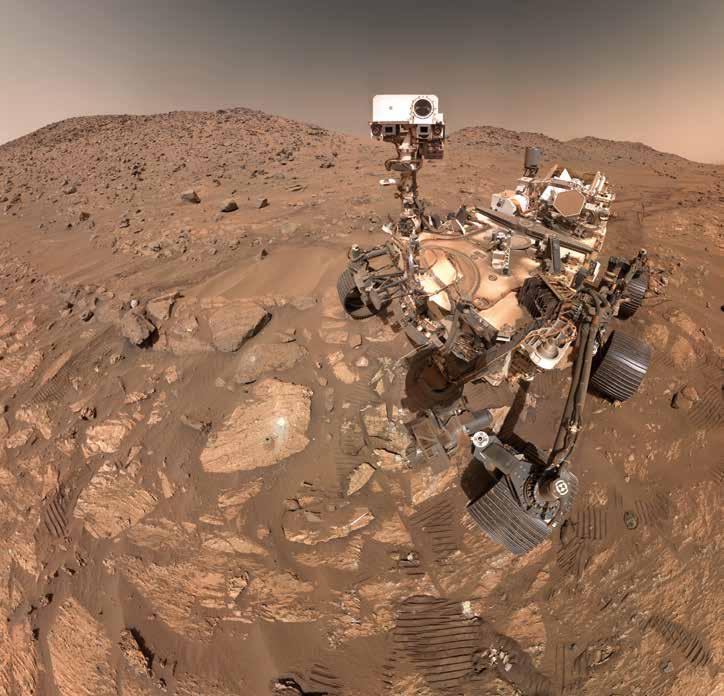
OUT OF THIS WORLD DISCOVERY
In 2024 the Perseverance Mars rover found an intriguing rock that is the most promising sign ever that microorganisms—and thus biological life—once existed on Mars. The rover uses a camera system developed by DTU researchers.
Organization
DTU is an independent and self-governed university administered by a Board of Governors and under the leadership of the University President and the Executive Board.
The main tasks are carried out by departments, research centres and affiliated companies.
Support functions
Campus Service
Communications and Media
Finance and Accounting
Human Resources
Policy and Relations
Research, Advice and Innovation
Study Programmes and Student Affairs
Departments
Boards and councils
Academic Council
Employer Panel
Board of Representatives
Advisory boards
Education committees
Affiliated companies
Bioneer Ltd.
DFM Ltd.
PreSeed Ltd.
DTU Science Park Ltd.
DTU Offshore
Danish Offshore Technology Centre DTU Biosustain The Novo Nordisk Foundation Center for Biosustainability
DTU Entrepreneurship Centre for Technology Entrepreneurship Centres
Executive Board
DTU Learn for life
Centre for Lifelong Learning
DTU Nanolab National Centre for Nano Fabrication and Characterization
DTU Skylab Innovation Hub



Claus
University Director Executive Vice President




and Student Affairs Senior Vice President
Human resources
6,295 Total staff full time equivalent (FTE) 40% are women
2,359 Researchers and educator full time equivalent (FTE) 60% have an international background
1,689 PhD fellows 60% have an international background 42% have an international background
2,760 in support functions full time equivalent (FTE) 15% have an international background 103 nationalities*
74% of all staff are below 50 years of age * based on data on citizenship
44,238 Members in DTU’s alumni network
54% of all alumni have joined the alumni network
Campuses
DTU Lyngby Campus
Located 15 km north of Copenhagen, DTU’s main campus sits on 106 hectares that feature wooded areas, sports fields, inner courtyards, and gardens.
DTU Ballerup Campus
Located 10 km west of Copenhagen, DTU Ballerup Campus is home to many of our BEng students.
DTU Risø Campus
Located 40 km west of Copenhagen, DTU Risø Campus is the site of much of DTU’s groundbreaking research in wind energy technologies.
DTU Hirtshals Campus
Located in one of Denmark’s most important fishing towns, DTU Hirtshals Campus is a hub for research in fisheries and aquaculture and houses two of DTU’s study programmes.
Arctic DTU Sisimiut—Ilinniarfeqarfik Sisimiut
DTU’s campus in Greenland is home to research as well as BEng and MSc Eng students who follow our Arctic study programmes.
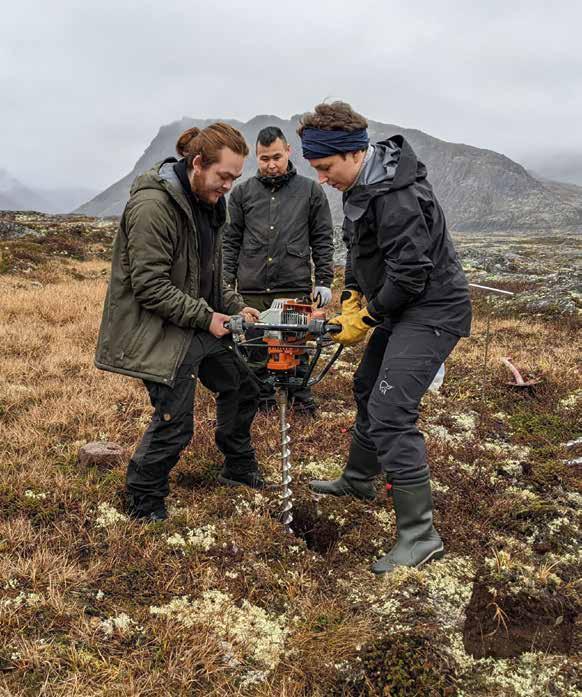
Locations
Technical
University of Denmark
Anker Engelunds Vej 101
2800 Kgs. Lyngby
Denmark
dtu.dk
